Nghiêm Huấn Từ
25-11-2024
Cuộc tranh cãi giữa Lenin và Kautsky là sự kiện lịch sử rất lớn trong phong trào Cộng Sản.
Tuyên Ngôn Cộng Sản ra đời năm 1848, khi chế độ phong kiến vẫn chưa hoàn toàn biến khỏi châu Âu. Sau đó 16 năm, khi Quốc Tế 1 thành lập, bản Tuyên Ngôn này vẫn chưa gây được ảnh hưởng gì. Vậy mà, sau 40 năm, khi Quốc Tế 2 ra đời, số đảng cách mạng tham gia có lúc đạt tới 90 – nói lên sự lớn mạnh của giai cấp công nhân.
Kỳ vọng rất lớn sẽ thực hiện được lời hô hào của Marx: Hỡi vô sản toàn cầu! Hãy liên kết lại! Trên thực tế, công nhân đã đủ sức bầu được nhiều đại biểu của mình vào Nghị Viện, cất lên tiếng nói của giai cấp mình.
Nguyên nhân? Đó là nhờ giai cấp tư bản đang thực thi sứ mệnh lịch sử của nó, khiến quá trình công nghiệp hóa tăng tốc, khiến tỷ lệ công nhân trong xã hội tăng lên, đồng thời cuộc sống được cải thiện mọi mặt, chế độ dân chủ được mở rộng, hiến pháp được thực hiện, ba quyền được phân lập…
Trong hoàn cảnh ấy, các đảng ở những nước công nghiệp hóa cao đã chuyển sang đấu tranh ôn hòa, thay cho cách đấu tranh “lật đổ” – như được dạy trong Tuyên Ngôn Cộng Sản. Đi đầu, là đảng ở những nước công nghiệp tiên tiến nhất (Đức, Anh, Pháp)…
Lớp đảng viên già đã tận mắt quan sát được sự thay đổi của xã hội, đã dùng uy tín và thâm niên của mình, đề nghị từ bỏ cách đấu tranh “lật đổ” (quá mạo hiểm, rủi ro, không thích hợp với một xã hội văn minh). Họ bị những người trẻ phản đối, nhưng dần dần bị thực tế thuyết phục, ngoại trừ Lenin.
Lenin đã kiên định đến cùng cách đấu tranh “lật đổ”, sử dụng bạo lực tối đa có thể. Tất nhiên, về đối nội, Lenin phải thanh toán phe “ôn hòa” (Mensheviks) trong nội bộ đảng Nga, ngay từ trước khi chiến tranh 1914-1818. Về đối ngoại, Lenin chủ động tấn công hai cụ già là Kautsky và Bernstein, cũng từ trước chiến tranh.
Nguyên nhân sâu xa là Đảng cách mạng ở nước Nga – nước duy nhất vẫn còn chế độ phong kiến – chưa qua cách mạng tư sản. Lẽ ra, theo quy luật mà Marx nêu, đảng ở Nga phải làm cách mạng tư sản (lật đổ phong kiến) trước đã.
Dưới đây là một số hình ảnh minh chứng, liên quan thái độ tranh luận
Sách của Kautsky: Năm 1918, gồm Bìa và Mục lục
Karl Kautsky, Die Diktatur des Proletariats, Vienna 1918.
Karl Kautsky, The Dictatorship of the Proletariat, National Labour Press 1919. Do Einde O’Callaghan dịch, dành cho Marxists’ Internet Archive.
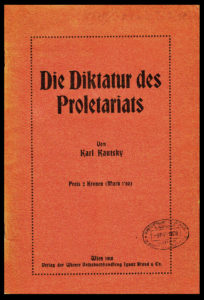
Contents (Mục lục)
I. The Problem
II. Democracy and the Conquest of Political Power
III. Democracy and the Ripening of the Proletariat
IV. The Effects of Democracy
V. Dictatorship
VI. Constituent Assembly and Soviet
VII. The Soviet Republic
VIII. The Object Lesson
IX. The Legacy of the Dictatorship:
(a) Agriculture
(b) Industry
X. The New Theory
Sách của Lenin, tiếng Nga, xuất bản cuối năm 1918
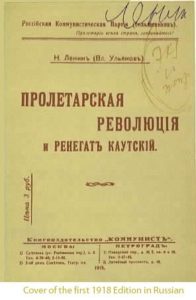
Bìa sách (tặng) tiếng Nga, có chữ ký của Lenin
Table of Contents (Mục Lục)
– Preface
– How Kautsky Turned Marx Into a Common Liberal
– Bourgeois and Proletarian Democracy
– Can There Be Equality Between the Exploited and the Exploiter?
– The Soviets Dare Not Become State Organisations
– The Constituent Assembly and the Soviet Republic
– Subservience to the Bourgeoisie in the Guise of “Economic Analysis”
Appendix I. Theses on the Constituent Assembly[41]
Appendix II. Vandervelde’s New Book on the State
Sách của Lenin “Cách mạng vô sản và tên phản bội Causky”, được dịch ra tiếng Việt, xuất bản và phổ biến tại Việt Nam, hiện có bán trên mạng:
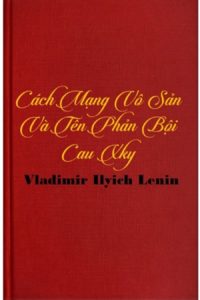
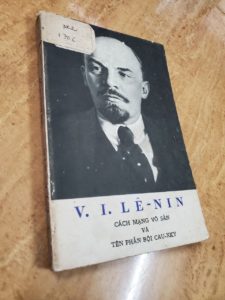
Sách của Lenin: Rất nhiều ấn bản bằng tiếng Anh (tạm đưa 18 bản). Sách dành cho độc giả nước ngoài. Gửi ra ngoại quốc hoặc phát cho khách tham quan, dự hội nghị ở Nga. Tái bản rất nhiều lần.
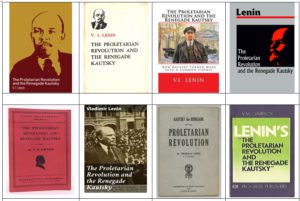
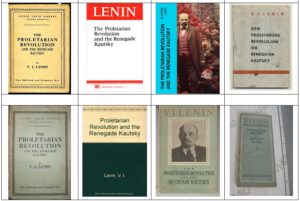
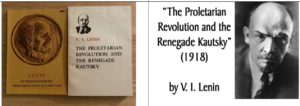
Phụ lục: Công trình nghiên cứu của Kautsky:
1881: State Socialism
1881: The Abolition of the State
1882: The Free Society
1886: Lawyers’ Socialism (with Frederick Engels)
1887/1903: The Economic Doctrines of Karl Marx
1888: Thomas More and his Utopia
1889: Ferdinand Lassalle – A 25-year memorial
1892: The Class Struggle (Erfurt Program)
1895: Our American Reports by F.A. Sorge
1896: Exchange on Historical Materialism – Debate with E. Belfort Bax
1897: Communism in Central Europe in the Time of the Reformation
1899: The Hanover Congress
1899: Frederick Engels: His Life, His Work and His Writings
1899/1900: Autobiographical Sketch
1900: Germany, England and the World Policy
1900: Class War and Ethics
1901: Trade Unions and Socialism
1901: Bernstein’s old articles and new afflictions
1902: The Two Tendencies
1902: Socialist Agitation Among Farmers in America
1902: Karl Kautsky. Autobiography
1902: The Social Revolution and on the day After the Social Revolution
1903: The Social Revolution and on the Morrow of the Social Revolution
1903: The Aims and Limitations of the Materialist Conception of History
1903: The Intellectuals and the Workers
1903/04: Clericalism and the Socialist Attitude Thereto: A Symposium
1904: On the Problems of the Jewish Proletariat in England
1904: Saint Francis of Assisi – Revisionist of Medieval Communism
1904: To What Extent is the Communist Manifesto Obsolete?
1904: Wardour Street Economics (letter)
1905: Gapon and Socialist Unity
1905: Differences Among the Russian Socialists
1906: Ethics and the Materialist Conception of History
1906: Revolutions, Past and Present
1906: On socialism and trade unionism
1907: Anglo-German Relations
1907: Socialism and Colonial Policy
1908: Foundations of Christianity
1908: The Historic Accomplishment of Karl Marx
1908: Practical Work in Parliament
1909: Must the Proletariat Degenerate?
1909: The Road to Power
1909: Sects or Class Parties
1909: Samuel Gompers, August 1909
1909: Letter to Upton Sinclair, September 1909
1909: Letter to Upton Sinclair, December 1909
1910: England and Germany
1910: What Now? (Continuation)
1910: A New Strategy
1911: The Capitalist Class
1911: Finance-Capital and Crises
1911: Letters to Luttes des Classes
1911: War and Peace: Thoughts for the May Day Festival
1912: The Struggle of the Masses
1912: Capitalism in the Ancient World
1912: The First of May and the Struggle against Militarism
1912: Disarmament and Colonial Policy
1912: Victor Adler
1912: War And Revolution
1912: The “Intellectuals” and Party Principles
1912: Review of Algie Martin Simons’ Social Forces in American History
1912: Gold, Paper Currency and Commodity
1913: High Cost of Living: Changes in gold-production and the rise in prices
1914: Are the Jews A Race?
1914: Ultra-Imperialism (alternate translation)
1914: Preparations for Peace
1917: Prospects of the Russian Revolution
1917: The Russian Revolution
1918: The Dictatorship of the Proletariat (tranh luận)
1918: The Bolsheviki Rising
1918: Driving the Revolution Forward
1919: Terrorism and Communism (tranh luận)
1919: Guidelines for a Socialist Action Programme
1919: The National Constituent Assembly
1921: Georgia
1922: Ireland
1922: The Moscow Trial and the Bolsheviki
1922: War Guilt (letter)
1923: Methods of Peace-Making
1924: Epitaph of Lenin
1924: The League of Nations
1924: Revolution and Counter-Revolution in Germany
1925: The Labour Revolution
1925: The Lessons of the October Experiment
1927: The Materialist Conception of History – Section Five: The Dialectic
1928: My Book on the Materialist Conception of History
1928: Nature and Society
1932: Communism and Socialism
1934: Hitlerism and Social-Democracy
1934: Marxism and Bolshevism – Democracy and Dictatorship
1937: Unemployment and shortening of the working day
1946: Social Democracy versus Communism




